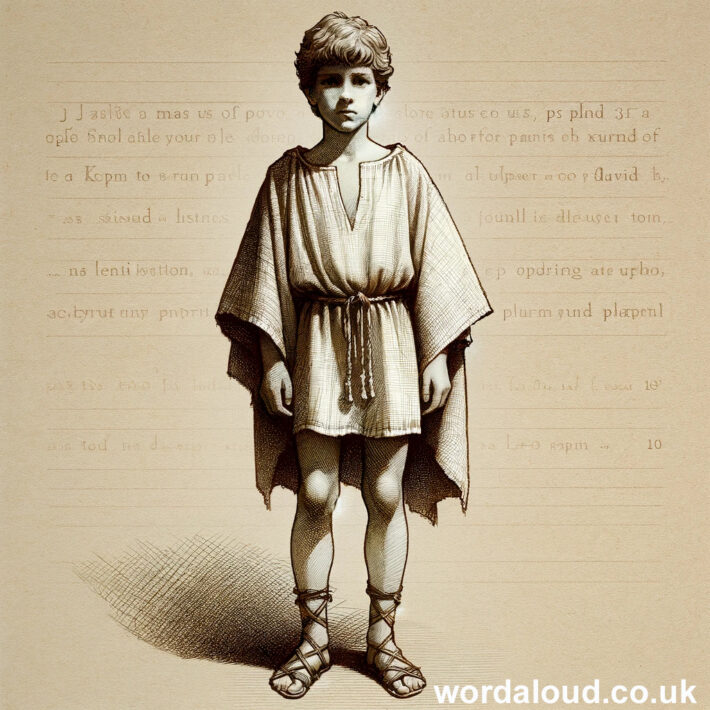Christian Art | Prayer With Jesus | Psalms | Thanksgiving And Praise | King David As A Boy | Audio KJV | Love Revealed By Jesus Christ | King James Audio Bible
Psalm 138 | King James Audio Bible
YouTube: Psalm 138 KJV | King James Audio Bible | Word Aloud
Psalm 138, a psalm of David, opens with a declaration of wholehearted praise. The psalmist commits to singing praises before the gods, a gesture of both defiance and faith. This act, set against a backdrop of a polytheistic world, underscores the psalmist’s devotion to the one true God.
The psalm expresses worship in the holy temple, honouring God’s name for His lovingkindness and truth. This reverence is grounded in the belief that God’s word holds supremacy, even above His name, highlighting the power and importance of God’s promises and commandments.
Verse three expressing a personal relationship with God, acknowledging a moment of divine intervention: ‘In the day when I cried thou answeredst me.’ This personal testament to God’s responsiveness in times of need expresses intimacy and gratitude.
The fourth verse expands the scope to include all the kings of the earth, predicting their future praise of God upon hearing God’s words. This universal acknowledgment of God’s supremacy speaks to the far-reaching impact of His word and deeds.
Verse five expresses once more universal praise, with focus on the glory of the Lord. Here, the psalmist anticipates a time when all will sing of God’s ways, celebrating God’s greatness.
The sixth verse introduces a contrast between God’s transcendence and His attention to the humble. Despite being high, God shows respect to the lowly, while keeping distance from the proud. This verse emphasizes God’s justice and preference for humility over arrogance.
In verse seven, the psalmist returns to a personal narrative, speaking of God’s protection in the midst of trouble. Imagery of God stretching forth His hand against the wrath of enemies and using His right hand to save, offers a vivid portrayal of divine rescue and strength.
The psalm concludes with an affirmation of God’s enduring mercy and a plea for the Lord not to forsake the works of His hands. This final verse encapsulates a trust in God’s continued presence and care, sealing the psalmist’s faith in divine providence and everlasting love.

![]()
Psalm 138 | King James Audio Bible
I will praise thee with my whole heart: before the gods will I sing praise unto thee.
I will worship toward thy holy temple, and praise thy name for thy lovingkindness and for thy truth: for thou hast magnified thy word above all thy name.
In the day when I cried thou answeredst me, and strengthenedst me with strength in my soul.
All the kings of the earth shall praise thee, O Lord, when they hear the words of thy mouth.
Yea, they shall sing in the ways of the Lord: for great is the glory of the Lord.
Though the Lord be high, yet hath he respect unto the lowly: but the proud he knoweth afar off.
Though I walk in the midst of trouble, thou wilt revive me: thou shalt stretch forth thine hand against the wrath of mine enemies, and thy right hand shall save me.
The Lord will perfect that which concerneth me: thy mercy, O Lord, endureth for ever: forsake not the works of thine own hands.

![]()
Psalm 138 | King James Audio Bible
Pope Benedict XVI offered reflections on Psalm 138 (Psalm 137 in the Vulgate). During his General Audience on December 7, 2005, Pope Benedict emphasized the psalm as a Judaic hymn of thanksgiving, notable for its personal expression of gratitude and adoration toward God. Pope Benedict highlighted that the psalm opens with a declaration of worship before the holy temple in Jerusalem, representing a space where the divine and the earthly meet. The psalmist’s confidence in God’s virtues of faithfulness and mercy, and the acknowledgment of divine responsiveness in times of distress, were key points of focus.
Pope Benedict also interpreted the psalm in a universalistic context, where the testimony of the psalmist extends to envision all the earth’s kings joining in praise of the Lord. This vision of universal praise was seen as indicative of the future Church of the pagans, forming a future universal Church. The psalm’s reflection on God’s exalted nature yet His affection for the lowly, as well as His rejection of the proud, was highlighted as an essential message not only for rulers but for all individuals.
Finally, Pope Benedict’s reflection conveyed a message of trust and hope, emphasizing belief in God’s eternal goodness and God’s commitment to not forsake His creations. This psalm becomes a source of comfort and assurance, reinforcing the belief that despite life’s trials, believers are never alone and always within God’s care
In another commentary, Pope Benedict XVI described the psalm as a song of confidence, affirming God’s constant presence with us, even in life’s darkest nights and most challenging moments. He noted that the Lord accompanies us even in the final solitude of death, offering a profound sense of comfort and reassurance to Christians that they are never alone. Pope Benedict XVI’s reflection also included insights from St. Gregory the Great, who emphasized the importance of every individual in the Christian community, regardless of their spiritual strength. This inclusive interpretation underlined the role of even the weakest believers in contributing to the Church’s structure, grounded in their love for God and neighbour to the best of their understanding

![]()
Psalm 138 | King James Audio Bible
- Wholehearted Praise And Worship: The psalm begins with a declaration of praise and worship towards God with a whole heart, signifying complete and sincere devotion.
- God’s Supreme Word: There is an emphasis on the magnificence of God’s word and truth, highlighting that God’s word is exalted above all His name, reflecting the power and importance of His promises and commandments.
- Divine Response And Strength: The psalmist acknowledges God’s responsiveness to his cries for help and the strength provided by God in times of distress, emphasizing God’s attentiveness and support.
- Universal Recognition Of God: The psalm predicts that all kings of the earth will eventually praise God, recognizing His supreme authority and the impact of His word and deeds.
- Contrast Between God’s Majesty And Humility: Despite God’s transcendence, He shows respect and attention to the lowly, while distancing Himself from the proud, illustrating God’s preference for humility over arrogance.
- Protection And Salvation: The psalmist speaks of being surrounded by troubles, yet trusting in God’s ability to protect and save him from his enemies, symbolizing God’s role as a protector and saviour.
- Enduring Mercy And Faithfulness: The psalm concludes with a trust in God’s ongoing presence and care, affirming the everlasting nature of His mercy and the plea for God not to forsake the work of His hands, indicating a deep faith in God’s enduring commitment to His people.








